Peter MALONE
Saturday, 18 September 2021 19:58
Waking Up in Reno
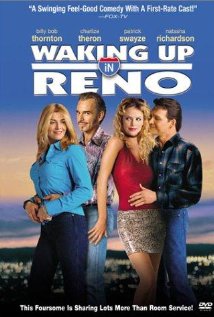
WAKING UP IN RENO
US, 2002, 91 minutes, Colour.
Natasha Richardson, Billy Bob Thornton, Patrick Swayze, Charlize Theron, Holmes Osborne, David Koechhner, Penelope Cruz, Chelcie Ross.
Directed by Jordan Brady.
Waking up in Reno is a marriage comedy for people in midlife.
There is both a comic tone, seen in the introduction to the characters and the animation for their trip from Arkansas to Reno. But there are quite serious undertones in marriages and the friendship between the two central couples.
There is something of a touch of mockery in the presentation of the characters, from the South with their deep accents, presented as something of the equivalent of trailer trash. This is a bit unfair to their basic humanity and their struggles.
Natasha Richardson is very good is Darlene, accent and all, married to Lonnie, Billy Bob Thornton, with a car dealership and television ads to match. However, she is somewhat withdrawn in her marriage, despite her husband’s pleas to her. It is not surprising that he has a short affair with the wife of his best friend. He is played by Patrick Swayze and she by Charlize Theron.
They decide to go on a trip to Reno and there are various humorous adventures on the way. In Reno, all seems to be going well – despite the prostitute in the bar, an unusual cameo from Penelope Cruz at this stage of her career – but the crisis emerges when Patrick Swayze gets results to show that he cannot have children and his wife is pregnant. The film is interesting in showing how each reacts in their own way – as well as how the situation is resolved with some kind of discussion, peace, and Darlene eventually getting self-confidence and joining in her husband’s TV commercials.
1. A romantic comedy for those in middle age? From comic to serious?
2. The light tone, the introductions to the central characters, the map of their trip, laughing with them, laughing at them? Southern types and accents? The touch of mockery?
3. Road trip, Arkansas, Oklahoma, Texas, Arizona, Nevada, Reno? The road, the diners, Reno and the motel, the Grand Canyon? The musical score?
4. The title, two senses, waking up physically, waking up to themselves?
5. Natasha Richardson as Darlene? Her age, self-image, life, with Lonnie and his dealership, the nature of their marriage, her sexual reticence, the children? Eager for the trip? Wanting to see the Grand Canyon? Lonnie cutting it out because of timetable?
6. Lonnie, his television ads, his character, age, obtuse in understanding Darlene, his wanting her response? His sexual relationship with Candy? Insensitive to her and her throwing things at him? The plan for the trip, getting the vehicle, driving through the Stop sign, the discussions with the police and the bribe of the beer? At the diner, the big stake, eating it, getting $50, being sick? The importance of the timetable? Staying at the motels? The decision to miss out on the Grand Canyon and insensitive to Darlene’s disappointment? Arriving in Reno, Lonnie pleased but, his meanness in the tip? Drinks, the bar, the prostitute cruising the bar, talking with him? The importance of the scenes with Darlene and his pleading to her for some kind of sexual response?
7. Patrick Swayze is Roy, rather slow-witted, friend with Lonnie from school, Candy and her father, his owning the factory, their wedding, the concern about ovulation, his interview with the doctor and having tests? At the factory, his father-in-law and the mistakes with the labels, his kindness to the worker, submitting to his father-in-law? Looking forward to the trip? Enjoying it?
8. The film and the strong emphasis on friendship, confiding in others, being close?
9. The hotel in Reno, the luxury, the role of the man working for the hotel, unctuous, wanting a tip? The girls going out? The boys at the bar? Candy and her wanting to get all the pregnancy tests, the result?
10. Roy and his results, slow on the uptake, Darlene realising what had happened, Candy and her embarrassment, her looking at Lonnie, his indifference?
11. The consequences for all of them? Lonnie and his excuses, Darlene and her anger, leaving, the fight with Candy at the elevator? Darlene going for a makeover, transformed, going to the club to see Tony Orlando, his song for her and her response? Roy and his bewilderment, going downstairs, the encounter with the prostitute, dancing? Candy, sad, talking with Lonnie and Roy arriving and misinterpreting their behaviour?
12. The hotel attendant, his interventions, people turning on him?
13. Tony Orlando, the performances in Las Vegas, his many fans?
14. The final talking things over, people giving way, Candy glad to be pregnant, Lonnie impregnating her instead of some in vitro process? Roy calming down?
15. The resolution – and four of them looking over the Grand Canyon?
16. At home, everything ordinary – except Darlene having more confidence, going to the dealership, Lonnie and his TV ads – and Darlene urging people to
come down and see her?
Published in Movie Reviews
Published in
Movie Reviews
Tagged under
Saturday, 18 September 2021 19:58
Deep, The/ Djupio
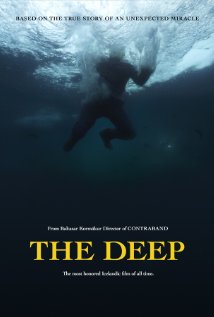
THE DEEP/ DJUPIO
Iceland, 2012, 95 minutes, Colour.
Olafur Atli Jonasson. Joi Johansson.
Directed by Baltasar Kormakur.
The Deep is based on a true story. It is set in and Iceland town and on the sea in the north of the country. a group of fishermen go out on the ship, the ship capsises and the crew are thrown overboard and, except for one, drowned.
The film establishes the town and the men, the family relationships, camaraderie, going out to sea. It also establishes life on the boat, and the relationship between the men.
However, most of the early part of the film shows what happens to one man when he goes into the sea and, despite the cold, he survives for some time before a rescue.
The second part of the film is about the treatment of the man, his being taken to England for tests, the puzzle of all concerned that he could have survived in the water so long – but, the point is made, that he was a large man, quite fat, and this enabled him to stay alive longer than the average person.
He returns home to his ordinary life but many see him as a hero because of his survival.
The film was co-written and directed by the prominent Icelander director, Baltasar Kormakur who directed films like 101 Reykjavik and Jar City. In later years he worked in the United States on such films as Contraband (remake of 101 Reykjavik), Two Guns and Everest.
1. The film based on a true story? Ships in Iceland? Accidents? Survival? Tests?
2. The atmosphere of Iceland, the village in the North, the details of life there, the town? The men, fishermen, drinking? The sequences at sea? The sequences in the hospital, tests in England? The musical score?
3. The title, the emphasis on the sea, the sea versus humans, survival in the deep?
4. The establishing the characters of the men, the different backgrounds, from the South and the North, the interactions? Planning to go to sea, the role of the authorities, the captain? Fishing?
5. At sea, the work, the weather, the storm? The ship capsising? The men into the sea?
6. The response of the men, the cold, trying to survive, mutual encouragement?
7. Gulli, an ordinary citizen, on the boat, his work, with the others, in the sea, his attempts to support others?
8. The detail of his being in the sea, in the depths, surviving in the cold, the wet, the long time, his being recovered? The flashbacks and their role in his survival? His swimming and surviving? His prayer, his promises to God – and later trying to keep them when he survived?
9. The authorities surprised at his survival, sending him to England, the doctors and nursing staff, the tests, his recovery? The speculations as to how he had survived? His being fat, his weight?
10. His return home, to an ordinary life, people responding to him as a hero, acclaim, the little girl? His going to console the family of his friend who died, interactions with his wife? The discussions with the priest and the contrast between their characters?
11. An Icelandic story and the Icelandic perspective?
Published in Movie Reviews
Published in
Movie Reviews
Tagged under
Saturday, 18 September 2021 19:58
Target Zero
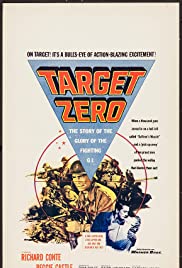
TARGET ZERO
US, 1955, 90 minutes, Black and white.
Richard Conte, Peggy Castle, Charles Bronson, Chuck Conners, Terence De Marney.
Directed by Armin Jones.
Target Zero comes rather late in the day of the films set in Korea, the action going back to the early 1950s, and the film coming out well after the end of the war.
It is a regular kind of war film, focusing on a small group, mainly American infantry but with three from a British tank and a woman from a United Nations body. She is travelling with a companion when they are hit, the companion killed, and she is rescued by the men in the tank. That have been observed but it is by the Americans who then introduce themselves.
The main part of the film is the group continually going forward, seeing the North Koreans in the distance and engaging in combat, some injuries on the American side, meeting some Buddhist monks, with the United Nations woman being delegated to care for the sick.
The film introduces the characters before the credits, naming them, giving something of their background, and what they bring them to their experience of warfare. Richard Conte had been in war films like A Walk in the Sun, not unlike this particular film. This is an early film for Charles Bronson who had been acting for some years but who was not to emerge as the star he became for another decada all more. Chuck Conners also appears in an early role as does L.Q. Jones.
A lot of the film is taken up with conversations and discussions between the characters, revealing who they are, their attitudes towards the war, as well as their involvement in action. There is also a romance between the United Nations woman, played by Peggy Castle, and Richard Conte.
The film was directed by Harmon Jones, a successful editor who became a director, making minor films and working extensively on television.
A film for the collection of all movies set in Korea.
Published in Movie Reviews
Published in
Movie Reviews
Tagged under
Saturday, 18 September 2021 19:58
Mistress America
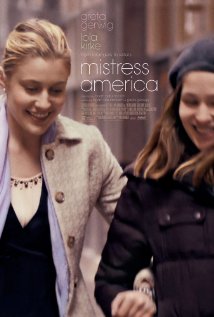
MISTRESS AMERICA
US, 2015, 84 minutes, Colour.
Greta Gerwig, Lola Kirke, Heather Lind, Michael Chernus, Kathryn Erbe.
Directed by Noah Baumbach.
Greta Gerwig gets very good reviews for her screen performances, especially in the films of Noah Baumbach, specifically Greenberg and the tour de force performance in Frances Ha.
There is quite some similarity between Frances Ha and Brooke, one of the central characters of Mistress America and the title subject of a short story written by the other central character, Tracy, played effectively by Lola Kirke.
Now, this is a New York story, which is not merely meant to be a descriptive phrase but something of a warning or a caution. The characters are those that we find sometimes in particularly New York stories, characters who have their eccentricities, live in an artificial world in a city that is really not like any other in the United States. They speak in a different way. Their concerns are different. They behave in ways that are unexpected and sometimes oddball. This is definitely the case in Mistress America.
The initial focus is on Tracy, at college, with great ambitions to be a writer and being chosen for the college club for authors, submitting her work, especially, after she meets Brooke, her story based on her imagination of an encounter with Brooke, which she calls Mistress America.
Tracy is a touch introverted, takes up with a young student with similar literary interests but who can’t quite relate to her as she wishes and takes up with another student. In the meantime, Tracy’s mother, with whom she has many phone conversations, is about to marry Brooke’s father and the suggestion is that Tracy look up Brook and get to know her future half-sister.
This happens, but Brooke is something of an enigma, 30 years old, starstruck about living in Times Square after her origins in New Jersey, living in a loft, her boyfriend marrying one of her friends who has also stolen her ideas for designs (as well as her cats), and Brooke is thinking of investing in a restaurant if she can find the money. This indicates that she is more than a little scatty. There is a key sequence in a restaurant where a woman approaches her, claims that they knew each other at school, then empties out her resentment at how Brooke bullied and insulted her at school – which Brooke blithely dismisses as her problem not Brooke’s.
After consulting a seer, Brooke decides to visit the old rival and her husband in Greenwich Connecticut, taking Tracy with her, as well as the young man from college and his girlfriend. There is quite some comedy in the encounter in Greenwich, Brooke confronting Maimie-Claire? about her ideas, taking her boyfriend – and the cats. Also in the act is a woman from a group that had been meeting at Maimie Claire’s who is waiting for her husband, the neighbour who is not very happy about Maimie Claire and her husband. Through roundabout means, everyone has the opportunity to read Tracy’s story – and all of them are against it, on Brooke’s side, who declares she has been betrayed and is hurt.
And the parents’ marriage is off, Tracy’s mother refusing to become a Catholic!
In a film like this, the only remaining thing is to find out in what direction Tracy is going and whether she can reconcile with Brooke – and whether she is going to have a literary career. And to find out in which direction Brooke would go (and a sequel is not unthinkable!).
1. A New York story, characters, situations? The appeal to the New York audience, American audience – non-Americans? Age, relationships, jobs, experiences?
2. Audiences identifying with Tracy and with Brooke? Observing them?
3. The director, his stories, eccentric personalities, women, personal, small films?
4. Greta Gerwig, her career, collaboration with the director?
5. The title, Tracy’s short story, about Brooke? Its publication? People reading it? Brooke’s reaction?
6. The screenplay, the dialogue, the satire, mock situations, characters? The score?
7. The New York settings, Times Square, apartments, College? The visit to Greenwich, Connecticut?
8. Tracy’s story, her age, experience, wanting to be a writer, her relationship with her mother, her absent father, mother marrying again, their phone conversations? At College, quiet, the friendship with Tony, the discussions about the book club, the sharing, the date, seeing him with Nicolette? His inability to relate more intimately with her? Her mother’s suggestion about contacting Brooke?
9. Brooke, her age, relationship with her father, his intending to marry Tracy’s mother? Actually breaking it off because of her religious views, not becoming a Catholic? Brooke, her life, eccentricities, speaking her mind directly, moving to Times Square, taking on Tracy, letting her stay, their shared conversations? The story of her relationship with Dylan, Maimie Clare marrying him, taking her ideas on production, taking her cats? Her resentments?
10. Out and about with Tracy, the woman remembering her days at school, confronting Brooke, Brooke’s blaming her, her reaction? Hurt? Her treatment of people? Going to the apartment, the locks changed, the friend downstairs, letting them through, going out the fire escape?
11. Going to the seer, his looking into the future, the discussions with Brooke, the interpretation concerning Maimie Clare, advising her to go to see her?
12. Taking Tracy with her, meeting the neighbour, his guiding them to the house, his complaints, later turning up again and being part of the group around Brooke?
13. Maimie Clare, personality, manner, her reaction to Brooke, marrying Dylan, the discussions with Brooke, seeing the cats, the accusation about stealing ideas?
14. Dylan coming home, his relationship with Brooke, commenting about her being funny and her attempts to be funny? Dylan and his relationship with Maimie Clare?
15. Brooke, the plan for the restaurant, the investment, needing the money, Dylan willing to give it to her?
16. Tony and Nicolette, accompanying Brooke and Tracy in the car, beeing interested in the women’s group, joining them, becoming friendly? Tracy and her approach to Tony, Nicolette seeing them and Tracy’s kiss, her reaction, going upstairs, Tony trying to remedy the situation?
17. The lady from the group, lawyer, waiting for her husband, becoming involved?
18. Nicolette reading the story, coming downstairs, showing it to the others, everybody reading it, Brooke’s negative reaction, the others on her side, the possibility of a lawsuit? Tracy and her defence of it being only a story? Brooke and her attack on Tracy? Saying she was hurt? The fact that there would be no marriage?
19. Tracy, her story being published, joining the group, but thinking them snobs, throwing the briefcase into the water? Her coming to see Brooke, the lodger downstairs, his letting her through, going up the fire escape and coming to the window, the discussions, Brooke intending to go to California, Tracy going to see the seer, his advice for the future? Tracy still wanting to have Brooke has a half sister? Brooke and her resentment? Relenting? Her future?
Published in Movie Reviews
Published in
Movie Reviews
Tagged under
Saturday, 18 September 2021 19:58
Third Finger, Left Hand

THIRD FINGER, LEFT HAND
US, 1940, 96 minutes, Black and white.
Myrna Loy, Melvyn Douglas, Raymond Walburn, Lee Bowman, Bonita Granville, Felix Bressart, Donald Meek, Sydney Blackmer, Ernest Whitman, Halliwell Hobbes.
Directed by Robert Z. Leonard.
Third Finger, Left Hand is a very entertaining screwball comedy in the MGM tradition, especially with Myrna Loy and a part that might have been written for William Powell, her co-star in many similar films. This time it is Melvyn Douglas who had been playing leads with Greta Garbo, Joan Crawford, Rosalind Russell.(Later he was to win to Oscars for Best Supporting Actor, for Hud and for Being There.)
The title obviously refers to marriage. Myrna Loy easily portrays a career woman, editor of a magazine, pretending to be married so that she is acceptable to her staff as well as to the wife of the roving-eyed boss. She is able to keep up the pretence with the help of the firm’s photographer, Felix Bressart, who writes letters in the fictitious husband’s name. Lee Bowman portrays a lawyer who is in love with her and would like her to divorce her absentee husband. Raymond Walburn is her father and Bonita Granville her younger sister. There are some amusing cameos from Donals Meek as a fussy art entrepreneur and Sydney Blackmer as would-be suitor.
More importantly, and noted by many people, Ernest Whitman, an African American actor, portrays the porter on the train, doing the waiting and talking in the usual character fashion until it is revealed that he has been doing law by correspondence and is able to hold his own in legal discussions.
The film is one of the least known by director, Robert Z. Leonard, who at this time was making such films as New Moon, Pride and Prejudice, When Ladies Meet.
1. A pleasing screwball comedy? Of the 30s and 40s? The relevance of this issues, especially for a career woman and marriage in later decades?
2. MGM production value, black and white photography, the publishing house and its officers, the mansion, the wharf on the ship, diners? The musical score?
3. The strong cast, their reputations for this kind of film?
4. The portrait of Margot, strong woman, editor, with the boss and his floating, with his wife, the new member of staff, her reliance on August, friendship, writing the letters from her non—existent husband? Philip and his wanting to marry her? The background of her father, and her younger sister?
5. Going to the wharf, making the mistake about the paintings, the manager of the gallery, her being rude to him, claiming to represent the artist, discovering the mistake she had made, tried to brush it off, his persistence, the meeting with the manager, her skill in bargaining and getting the best possible contract for Jeff?
6. Jeff, his background, proud of his background in Ohio, not liking New York? His being upset with Margot’s behaviour? His gratitude towards her? Going out, her ringing him at the hotel, the evening at the restaurant, the drunken suitor and revealing the truth? Her describing the non-existent husband by looking at one of the staff (as you’d done so for the private detective, describing August)? Jeff and his being upset?
7. Philip, wanting to marry her, wanting a divorce? But having to get married in order to get the divorce?
8. Jeff, investigations in South America, his decision to impersonate the husband, arriving at the home, the father delighted to meet him, the sister delighted, the reaction of the Butler? Margot shock, wanting to get rid of him, the guests arriving? The awkwardness of the meal and Jeff enjoying himself?
9. Staying the night, Margot ousting him onto the balcony, the storm, the extra blanket, soaking, their both getting colds, being upset? His telling the truth to Philip? His getting the legal papers, ranging Niagara Falls for the wedding, helping during the cold I standing on his head?
10. Niagara Falls, the wedding, the lecture from the officiate? Sitting on the bench, waiting, the people from Ohio please to see Philip? Margot and her accent and pretending to be a woman from Brooklyn?
11. The aftermath, the documents, her upset the thinking twice, the photo at the novelty parlour? Jeff and his being upset? The success of his exhibitions? The decision to go on the train?
12. The three in the carriage, Jeff and his waking people up, the bright idea to ask Sam, the porter, to impersonate a lawyer? The African American actor in 1940? The role of porters? His correspondence course? Knowing the law – and his keeping more than pace with Philip?
13. Arriving in Ohio, the crowd to meet Jeff, arranged by Margot? The happy ending?
Published in Movie Reviews
Published in
Movie Reviews
Tagged under
Saturday, 18 September 2021 19:58
Hard Target
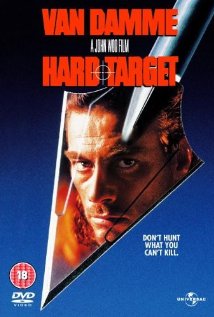
HARD TARGET
US, 1993, 100 minutes, Colour.
Jean- Claude van Damme, Lance Henriksen, Yancy Butler, Arnold Vosloo, Kasi Lemmons, Chuck Pfarrer.
Directed by John Woo.
After a strikingly successful career in Hong Kong, during the 80s and 90s, John Woo moved to the United States and made Hard Target, Nowhere to Run and, a masterpiece, Face/Off with John Travolta and Nicolas Cage.
He also made the World War II story about Native American Indians, the Windtalkers. But he returned to China and made a number of films, especially dramatizing, in epic style, a lot of Chinese or history.
This is a vehicle for Jean- Claude Van Damme, nicknamed ‘the muscles from Brussels’ and here, getting older after his adventures in the 1980s, making quite a series of American action films – and then for many years relying on straight to DVD action shows. There was an interesting biographical action film made in his native Belgium, JCVD.
The setting is New Orleans, Jean- Claude out of work, seen using his muscles by a young woman looking for her father who has, after war action, gone to live on the street. The search leads them to two immoral entrepreneurs who seek out clients and offer them, for vast amounts of money, hunting humans. The girl’s father was one of these victims.
There is a sequence of a hunt of human, Jean- Claude and the girl and getting help from the local police, but finally a huge showdown in a warehouse housing all kinds of masks and puppetry for Mardi Gras celebrations.
Lance Henriksen is always effective as a villain, as is Arnold Vosloo.
1. The popularity of Jean-Claude? Van Damme, in the 1990s, his martial arts skills, athletic, his career in action films?
2. The work of John Woo, in Hong Kong, China, in Hollywood, action films? And his signature scenes of two enemies facing off, backs to teach other, turning towards each other with guns drawn? At the end of this film?
3. The city of New Orleans, the different neighbourhoods, police precincts, the streets and the homeless, the feel of the city? The musical score?
4. The title, the initial hunting humans, the hunting of Boudreaux?
5. The opening hunt, vivid, the arrows, the pursuers, the presence of those organising it? The death of the victim?
6. Boudreaux, his character, appearance, intervening and saving Natalie, needing work, being chosen, the union dues, his decision to get the money? Going to Natalie, for hire?
7. Natalie, the story, her absent father, his military background, keeping in touch, no word for six months, arriving in New Orleans, witnessing Boudreaux and his skills with the men, going to the police, Marie Mitchell and Natalie’s anger with her? Hiring Boudreaux?
8. Boudreaux, his friends, the black man, on the streets, the military background? The difficulties on the streets? Natalie’s father, on the streets, his disappearance?
9. The notices for the phone sex, going to the distributor, the threats, his link with Fuchon and van Cleef, supplying the names for hunt victims, supplying Natalie’s father, Fuchon and his anger, wanting another candidate, their choosing the black man?
10. Fuchon, the chip with an dependence on van Cleef, their travelling to different countries, an agency for human hunts, their clients, the interview and the money? The organising of the hunt, the discussions with the victim, the promise of money, giving five minutes start, the visuals of the hunt, the skill of the man, the pursuit, the appeal for help, his being killed in the street?
11. The kiosk proprietor, his fears, wanting to escape, Fuchon and his bikers killing him?
12. Marie Mitchell, her work, support for Natalie, with Boudreaux, the chase, the siege on the street, being shot?
13. Boudreau, the threats to Fuchon? Setting up the hunt, the wealthy clients, the weapons? The pursuit of Boudreaux, his leaving the city, going to his uncle, his uncle and the arrows?
14. The drama of the siege, in the warehouse, the carnival masks, their size, concealment, the bizarre aspects? Boudreaux, his skills, eliminating the thugs, the final confrontation with Fuchon and van Cleef, the arrogance, their deaths? The shooting at his uncle?
15. Success, Natalie, Boudreaux, the uncle?
16. Entertaining action, John Woo style, martial arts?
Published in Movie Reviews
Published in
Movie Reviews
Tagged under
Saturday, 18 September 2021 19:58
Ran/ Chaos
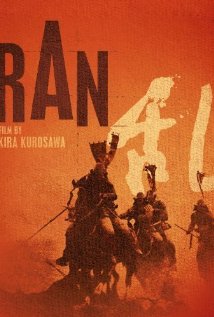
RAN/CHAOS
Japan, 1985, 162 minutes, Colour.
Tatsuya Nakadai.
Directed by Akira Kurosawa.
Ran/Chaos is a fine interpretation of Shakespeare’s King Lear. It is also magnificent to look at, brilliant colour photography, many outdoor sequences, including extraordinary battle sequences, solemn interiors.It is the work of classic Japanese film director, Akira Kurosawa, age 75 the time of making the film.
Kurosawa had emerged as a young director in the 1940s and, by 1949, with Rashomon, he had established an international reputation only to be enhanced during the coming 40 years with many Samurai dramas, contemporary dramas like Ikuru, and classics such as The Seven Samurai and his adaptation of Shakespeare’s Macbeth, Throne of Blood. In later years he began to make films in colour including films like Kagamusha, Dersu Uzala.
While there are no Shakespearean lines in this film, and the director altered aspects of the tragedy, especially the Lord having three sons rather than three daughters, but the outline the play is very clear. The powerful Lord has spent his life conquering local kingdoms and now wants to divide his kingdom between his sons. Two of them are flattering, the other blunt and critical. The Lord relies on the two allegedly loyal sons but the oldest, urged on by his wife who still resents her kingdom being conquered by the Lord, reduces his father’s retinue and sends him onto his younger brother. And the wife has designs on the younger brother as well, exiling his wife.
There are Japanese equivalents of the loyal and perfidious Dukes in Shakespeare’s play as well as loyal friends and, particularly striking, the fool who is a mirror to the Lord’s stupidities and madness. There are the scene of madness on the heath where the Lord has lost his reason, his being reunited with his son, but a very pessimistic ending with most of the characters dead.
But, Kurosawa has excelled in his filmmaking and bringing Shakespeare’s story alive.
1. The film considered a masterpiece, chorus and his career, range of films, treatments, adaptations of the classics? The move to colour in his later films? Made when he was 75?
2. The colour photography, the costumes, sets, landscapes? The dramatic sequences? The battles? The musical score?
3. The title, the focus on the era in Japan? The Great Lord and his life of conquests, the end of his rule, giving the castle is to his sons, their jealousies and vengeance, the consequences?
4. The film as an adaptation of NE, To Lear? Shakespeare’s plot and the variations, without Shakespeare’s text? The two Great Lord, his kingdoms, bequests to his sons Rutherford and daughters, the older son and his vengeful = spouse credits is, his revolt, his spouse and his brother, the sale of his wife? Those loyal to the Great Lord? Those who betrayed? The younger son and his forthrightness? The brothers and their being the equivalent of the three sisters? The humiliation of the Great Lord, the diminishment of his soldiers, allegedly because of their rowdiness, his being expelled, going to the fields, has grown madness? The role of the Fool, echoing the themes, mirroring the behaviour of the Great Lord? Accompanying him in all his difficulties? The blind brother? Those loyal to the Great Lord? His younger son, supporting him, the father’s apology, the sadness of the deaths, sadness in the kingdoms?
5. The Great Lord, his character, age, life of war, those wanting vengeance on him? The meeting, his sleep, his dream, the divisions of the kingdom, his sons professions of loyalty, the younger son and his blindness? Tango, the servant and his support and frankness? Exile? The Lord in attendance, the marriage deals? All taking place in the open Western Mark
6. the older son, his wife, her dominance and challenge, his turning against his father, the diminishment of the troops, humiliating his father, making them sit lower, interchange with the wife? His anger, going to his second son?
7. The intrigue between the two sons, or warning against their father, the role of the spouse, her betrayal, sexual attraction, seducing the brother, getting rid of his wife? Her motivations?
8. The role of the fool, in the court, mimicking, mining, foolishness reflected in the wind is full?
9. The King, going to the fields, the flowers and grass, the sheaves on his head, his madness? Moments of clarity? Going to the cave, thinking he was dead? The impact of his son’s treachery? His shame about his youngest son?
10. The younger son, going to his father, the reconciliation, the apology? Tango, loyalty? The battles and deaths?
11. The blind, his moment at the end?
12. The film of the battle sequences, the fastness, fastness, no special effects, camera work, editing and pace? The spectacle?
13. The overall impact? Audiences having an interpretation of Shakespeare, of the tragedy of king Lear
Published in Movie Reviews
Published in
Movie Reviews
Tagged under
Saturday, 18 September 2021 19:58
inIndian
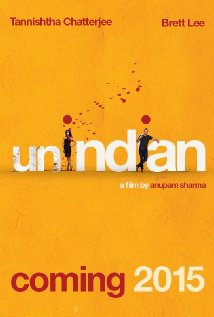
unIndian
Australia, 2015, 102 minutes, Colour.
Tanishta Chatterjee, Brett Lee, Arka Das, Maya Sathi, Sarah Roberts, Adam Dunn, Nicholas Brown, John Howard, Tiriel Mora, Anupam Sharma.
Directed by Anupam Sharma.
Local audiences may not know that there is an Australian Indian film foundation. It is Australian-based and, the company hopes that this film will be popular with Australian audiences, and, of course, with Indians who have settled in Australia. It is to be hoped that it will be popular in India but it does tackle some social problems that may be too much sometimes for Indian censorship.
Not that the film needs much censorship. Rather, it is a very cheerful film which provides quite a number of laughs, quite a number of emotional moments, does send up some of the stereotypes of Indian in-laws as well of Ocker Australians.
One of the key publicity aspects for both Australia and India is the fact that it stars veteran test cricketer, Brett Lee. While Lee has his done a number of commercials, he is not generally thought of as a movie leading man. Actually, he is quite a pleasant screen presence, cheerful, genial, and his romancing is quite credible.
The film spends a lot of time with Meera () and her 10-year-old daughter, Smitha. Meera has settled well in Australia, works as an executive for the firm Cochlera which promotes cochlear implants for hearing impaired people – and Cochlear is one of the sponsors of the film (with Brett Lee, in fact, as its international ambassador). Meera’s parents are of the old school, her mother busy ritually incensing a new house, planning to marry her daughter off to a surgeon (Indian background of course) and interfering in a stereotypical way. Her father is low key, less prone to action.
Brett Lee teaches a course at the University of New South Wales (well promoted in the film – for prospective students – and also a sponsor of the movie.). His course is a specialty, on Australian culture, training the overseas students to immerse themselves in Australian culture, vocabulary, accents and pronunciations – and quite a few funny scenes concerning Australian slang and, especially, the pronunciation of the word mate with its difficult vowel for newcomers to the country. There is a little drama of the department wants to axe the course – and the media comes to the rescue in the form of coverage by SBS.
It’s one of those love at first sight stories, at least on Brett Lee’s part. He seems to be meeting Meera all over the place, at an Indian celebration with people blowing paint all over each other, at some cricket practice, and then doing camera work for his close friends, TK and Mitch, for a TV series on cooking.
So, this is a film about courting, about parental disapproval, about coffee and romance.
Towards the end, there are some more serious themes, especially about Meera’s ex-husband and the fact that he is gay and the issue of his coming out, of his wanting to abduct his daughter and take her back to India – and there is some apprehension on the part of the film makers that this may not be too welcome in India and might damage the film’s distribution.
Be that as it may, this is a film that for audiences wanting an easy night out will be easy to enjoy and get some laughs. And, maybe, Brett Lee will get to do another film!
1. Genial story, an Australian story, Indian story? For both audiences?
2. The title, the Indian focus, the non-Indians? Comedy, caricatures, the meeting of cultures, clash of cultures?
3. Destination Sydney: the sites, Harbour Bridge and Opera House, showboat, the beaches, homes, cricket, the University of New South Wales, the Cochlear headquarters?
4. The music, the songs, the dancing, the final credits with everybody joining in?
5. Meera’s story, the opening dream, waking, the new home, her mother with the incense, her relationship with her parents, irritated by them, tolerating them? Her love for Smitha? The bond between mother and daughter? The background of the divorce, the gradual revelation of the truth, her husband’s family, his being gay, in the closet, abducting their daughter, going to prison, her parents not knowing the reality of his homosexuality? Reaction? Her mother and the thought of a means of cure?
6. The character of Will, the range of photos from his childhood to adulthood, the friendship with TK, with Mitch, shared flat, the television cooking program?
7. The Festival of Holi, colour, powder and paint, Meera and her daughter, Will persuaded to go, his white coat, Meera’s family and the plots for her to meet Samir? Will and his reaction, going to the drycleaner, meeting Meera, the different encounters, Meera doing the TV program, Will and Samir arriving and allowed to take over with the camera, his demands,, Will and his bonding with Smitha?
8. Will needing advice about Indian culture, the imagining the date and everybody looking at him, the awkwardness? Going to the cinema, the crowds, sitting next to Meera, the aunt coming and pushing him out of the seat? His sitting and imagining himself dancing and romancing in the film?
9. Will and Smitha, pleasant, meeting, talking, occasions to meet Meera, Will asking Meera to help Prya? Meera helping, Prya grateful, meeting TK and the romance, sitting with Will and the rehearsal of her having to leave? Possibilities for coffee?
10. His course, the students, Australian English, jokes, pronunciations, bonding? The head of the department and his hostility? TK and Mitch going to see the SBS producer, his agreeing, televising the interviews, the students giving testimony for Will, the Vice Chancellor? Will retaining his job, the overseas extension of the course?
11. Indian arranged marriages, Meera’s girlfriend, organising the girls night, inviting Samir, the explanation, Samir and his arrogance, the restaurant and bookings, the phone calls, Will and his disappointment? Flowers and a kiss as a sign of a date?
12. Smitha, reading the note with the flowers, not wanting Will and her mother to kiss? Wanting to visit her father, wanting his love, persuading Will to take her secretly?
13. On the showboat, Will taking Smitha to her father, the father saying Will had no idea of Indian culture? Will going to the hotel, his student at the desk, the word choice mistakes? The police, the information about the wharf, Smitha with her father, her disappointment, his arrest? Meera’s anger?
14. Will, upset, the new job, the television program, Meera watching it, Smitha not wanting Will to go? Going to the airport – and the explanation of the ICN network and the man at passport control turning Will back?
15. And a happy ending for all?
Published in Movie Reviews
Published in
Movie Reviews
Tagged under
Saturday, 18 September 2021 19:58
Easy Money/ Snabba Cash
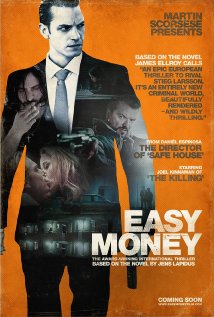
EASY MONEY/ SNABBA CASH
Sweden, 2010, 124 minutes, Colour.
Joel Kinnaman, Matias Varela, Dragomir Mrsic.
Directed by Daniel Espinosa.
Easy Money is the first in the trilogy about a young man, from a poorer background, who studies at University becomes involved in taxi driving to make ends meet but also in the shady work of the foreign-born taxidrivers.
This involvement in criminal activity leads to his further corruption, eagerness to get money, tangling with Serbs, especially a criminal with a daughter, and the possibility of a killing. Also involved in the plot is a criminal of Spanish origin who escapes from jail, goes back to meet his pregnant sister, and who also gets entangled with the Serb gangs and their leader.
However, the hero is inventive, with a business sense, and draws on his association with upper-class weeds, attracted to one of the sisters, proposing financial operations – which all go sour tea in the Serb find themselves in prison together.
These characters come together in the second film, Easy Money 2.
1. An interesting crime story? The first in the trilogy?
2. The Swedish settings, the city, the world of the wealthy and society, immigrant criminal gangs, garages, taxis, banks, prison?
3. Action sequences, car chases? Shootouts?
4. The title, JW and his ambitions, studies, schemes, the bank, driving and putting up Jorge, again clashes, overreaching himself, the contact with the
Serbians, capture and prison?
5. JW as a character, his age, experience, from the country, family background? Studies? Jobs, driving? The Arabs and their links? His work with them, being paid for putting up Jorge? The bond with him? High society, students, his friends, Sophie and the bond with her, the relationship? His being looked down on, yet invited to parties? Information about the banks? His studies, finance, accounting? His suggestion about buying the bank, negotiating? His skills? Being welcomed? The contact with the Serbians, with Mrado, his daughter? Being caught in the crossfire between the gangs, his options? In prison, with Mrado?
6. The opening in the prison, the inmates, organising his escape, over the fence, picked up in the car, running into the woods, going to see his sister, her pregnancy, her husband returning and ousting him? His mother? His links with the gangs? Their hiding him His sister and the child? His being in danger, the pursuit?
7. The Serbian gangs, migrants, their hold, in Sweden, links, drugs, money, violence?
8. The role of Mrado, in the gang, his violence? His daughter, taking her out, his delight in her, the drive? The shootings, shielding her? The pressure on him from the gang? The personalities and the pressures, contacts, plans?
9. His being wounded, taken?
10. JW and himself in prison, sharing their experience – and their future?
Published in Movie Reviews
Published in
Movie Reviews
Tagged under
Saturday, 18 September 2021 19:58
Putuparri and the Rainmakers

PUTUPARRI AND THE RAINMAKERS
Australia, 2015, 97 minutes, Colour.
Directed by Nicole Ma.
A must for those interested in aboriginal culture.
This film is set in Western Australia, at Fitzroy Crossing and the area around it. But the action also shows visits by a broad aboriginal family into the Great Sandy Desert to go back to rediscover and visit their homeland.
The Aboriginal man at the centre of the film is Tony Lawford who grew up in the area. He is back to his own tribal name, remembers the past, his marriages, his children, his drinking and making a mess of his life. However, he got his life together, became interested in local aboriginal culture and especially art work, and a huge canvas that was displayed in Canberra and which was brought back to Fitzroy Crossing.
The film also offers some explanation about the nature of aboriginal paintings, the subjects, the style, the incorporation of myths and history.
Particularly striking are Tony’s grandparents, Spider and Dolly – and the audience responds very well to their presence, Spider and his artwork, in some flashbacks and the initial journey into the Great Centre Desert, the discovery of a waterhole, the bringing up of the water, corroboree and dance; and then another trip to this homeland when there was plenty of water; with Sandy Spider and Dolly in their old age, having moved into a residential home for the elderly, but making this one last pilgrimage.
Fine photography, and incorporating video footage made during the previous trips.
1. The title? The focus on Tony Lawford, his ancestors, country? The Canning Track, Canning, the consequences, reparation?
2. The present footage, combined with that of the past the trips? The focus on persons, country, politics? Aboriginal history and issues?
3. The past footage, the photos, the film and the several visits and the differences, grandparents, Tony Lawford growing older?
4. Tony Lawford’s focus, speaking to camera, his own life story? The presentation of his grandparents, their children? His story, as young, and Fitzroy Crossing, marriage, drink? New family? To the ACT? Visits, change, art, heritage? The care for Spider and Dolly? The achievement? Peace?
5. The visuals of the country, Great Sandy Desert, five days of travel, fire, water, digging, the finding of the water flowing, immersion, performance of the rituals? The dance? Abundance of water, later visits, dry, digging again?
6. The importance of, the stories? The exhibition? Care, home, being in country?
7. The older generation, Spider and Dolly, their lives, art, the heritage, ageing, the visits, hospital, Aged Care Centre, the importance of the final trip in the visuals, the old people?
8. Succeeding generations, age, pilgrimages, dancing?
9. The Canning story, the vast tapestry, cared for in Canberra, down-to-earth with everybody looking at it, walking on it, the preservation, the interpretation of the desert and the track?
10. 1960s, the following 50 years, hardship and oppression?
11. The stories, the different generations, failures – but optimism?
Published in Movie Reviews
Published in
Movie Reviews
Tagged under